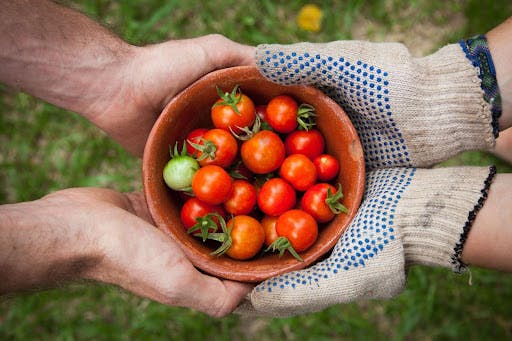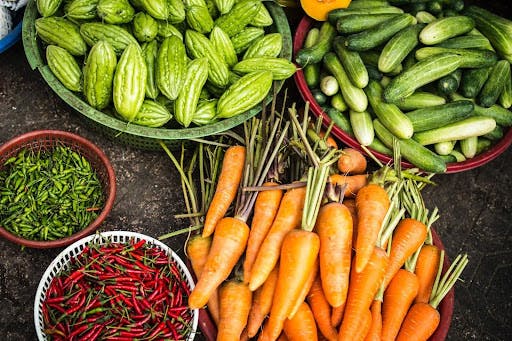Farm Diversification Ideas: Exploring Opportunities For UK Farmers
19 Jun 2023

Farm diversification is becoming increasingly important for UK farmers for many reasons: volatile food supply, volatile food demand, instability in fertilizer markets and a growing need for inter-generational succession planning. As of 2022, 68% of farm businesses across the UK engaged in some form of farm diversification activity.
In this article, we will explore various farm diversification ideas including renewable energy and highlight the opportunities they offer for sustainable growth and increased profitability. Additionally, we will introduce the PF Nexus platform, which provides valuable resources and connections for farmers looking to embark on diversification projects.
What is Farm Diversification?
Farm diversification is a strategic approach for farmers to expand income streams beyond traditional farming operations, ensuring long-term sustainability.
With changing market dynamics and challenges, diversification has become crucial. It involves exploring alternative ventures that complement existing practices, tapping into new markets, and generating additional income.
Diversification options vary based on location, resources, and market demand. Its objective is to create multiple income streams, reducing vulnerability to market fluctuations and policy changes. By leveraging assets, knowledge, and infrastructure, farmers can explore new opportunities and business models, mitigating risks and increasing resilience.
Through diversification, farmers can adapt, innovate, and secure the future viability of their agricultural businesses, promoting stability and sustainable growth. This strategic approach is becoming increasingly essential in today's dynamic and evolving agricultural landscape.
Why Are Farmers Having to Diversify?
Farmers are facing a multitude of challenges and changes in the agricultural landscape, which has led to the necessity of diversification. Several factors have contributed to the growing need for farmers to explore alternative income sources and expand beyond traditional farming operations.
- Changing Consumer Demands: Consumer preferences constantly evolve. They seek locally sourced, sustainable, and unique products, valuing transparency and ethical practices. Diversifying offerings allows farmers to meet these demands and tap into niche markets.
- Evolving Market Conditions: Agricultural markets are volatile and unpredictable. Diversification reduces reliance on a single market, protecting farmers from price fluctuations and trade disruptions. It spreads risks and ensures stable revenue streams.
- Policy Changes: Government policies, including Brexit, have introduced significant uncertainty for British farmers. Shifts in subsidies, trade agreements, regulations, and land use create challenges and impact profitability. Diversification helps farmers adapt to these policy changes by exploring alternative income streams and reducing their vulnerability to the uncertainties brought about by Brexit and other policy shifts.
- Climate-Related Challenges: Global warming poses risks to agriculture, including extreme weather and shifting growing seasons. Diversification helps farmers adapt by exploring resilient crops or livestock and mitigating climate-related risks.
- Economic Viability: Farm profitability is a concern due to rising input costs, competition, and fluctuating prices. Diversification generates additional and more stable income, and enhances overall farm financial sustainability.
By diversifying their income sources, farmers can reduce their exposure to these challenges and build a more resilient agricultural enterprise. Diversification allows farmers to adapt to changing market dynamics, reduce risks associated with external factors, and secure the long-term viability of their farming businesses.
Furthermore, diversification can bring additional benefits to farmers and their local communities. It can create employment opportunities, support rural development, strengthen local food systems, and contribute to the sustainability of the rural economy.

5 Farm Diversification Ideas
Renewable Energy
Renewable energy offers farm diversification with solar and wind projects seen as the most promising options. While initial costs are involved, investments in solar panels and wind turbines yield substantial returns. The UK government provides incentives and support for renewable projects, making it appealing to farmers.
- Solar Energy: By harnessing the power of sunlight, farmers can generate electricity and create additional revenue streams. As of 2022, 22% of farms across the UK engage in solar energy production. Compare this to 2011/12 where the proportion of farms producing solar energy was just 1%.
Solar farms – equipped with solar panels – capture sunlight and convert it into clean and sustainable electricity. The generated power can be either sold to the grid or used on-farm, providing a steady source of income and reducing reliance on traditional energy sources.
In the UK, the government offers incentives and support for solar projects, making it even more appealing for farmers to embrace this renewable energy option.
If you’re interested in starting a solar farm, it would be worth having a read of our guides that discuss solar power project financing and the solar project development process.
- Wind Energy: Wind power is another promising avenue for farmers to explore when it comes to renewable energy diversification. By establishing on-shore wind farms, farmers can harness the power of the wind to generate electricity. The energy produced can be sold to energy companies or used for on-farm consumption, offering long-term economic benefits and contributing to a greener energy system. With advancements in wind turbine technology and government support for renewable energy initiatives, farmers have the opportunity to tap into this lucrative sector and diversify their income whilst making a positive environmental impact.
Take a look at our guide on wind power project financing to find out more.
- Biomass Production: In addition to solar and wind, biomass production provides farmers with yet another avenue for renewable energy diversification.
Biomass refers to organic materials such as crop residues, wood chips, or crops that can be converted into heat, electricity, or biofuels. By utilising biomass resources, farmers can generate renewable energy and contribute to a more sustainable energy system. Biomass production offers opportunities to repurpose agricultural residues, diversify income streams, and reduce dependence on fossil fuels.
Government incentives and support programs further enhance the feasibility of biomass production initiatives, making it an attractive option for farmers looking to embrace renewable energy and achieve greater sustainability.
PF Nexus serves as a valuable platform, connecting project developers with renewable energy resources, experts, and funding opportunities. Through the platform, farmers can explore and navigate solar, wind, and biomass projects (amongst others) receiving guidance and support to maximise the benefits of renewable energy diversification.
By embracing solar, wind, and biomass as part of their diversification efforts, farmers can not only generate additional income but also contribute to a more sustainable and environmentally friendly future.
If you’re interested in starting a renewable energy business as part of your farm diversification plans, contact PF Nexus today to find out more.
Agritourism
Agri-tourism is a form of farm diversification that encompasses a range of activities and experiences, combining agriculture and tourism. It offers farmers an opportunity to showcase their farming practices, connect with visitors, and generate additional income by capitalising on unique rural landscapes and agricultural resources.
- Farm Tours: Visitors explore the farm, learn about agriculture, and engage with farm animals through guided tours. Educational and interactive, farm tours attract families, school groups, and tourists interested in first hand farming experiences.
- Bed and Breakfast Accommodations: Farmers offer unique rural experiences by converting part of their farmhouse into guest rooms. Comfortable lodging and breakfast with farm-produced ingredients appeal to travellers seeking an authentic countryside connection.
- Glamping and Camping: Farmers create glamping accommodations with luxury tents or cabins and provide campsites for traditional camping experiences. Visitors enjoy picturesque farm settings and farm-related activities.
- Farm-to-Table Experiences: Farmers offer farm-fresh meals, showcasing local produce and agricultural products. Farm dinners, food festivals, and cooking classes promote the farm-to-table concept and cater to the demand for sustainable, locally sourced food.
- Agricultural Workshops and Classes: Farmers provide hands-on workshops on topics such as organic farming, beekeeping, and cheese-making. Visitors learn new skills, connect with nature, and gain an appreciation for farming.
Agri-tourism benefits farmers by generating income, promoting education, and preserving agricultural heritage. It attracts tourists, stimulates local economies, and supports other businesses. Farmers should provide quality experiences, ensure visitor safety, and comply with regulations. Effective marketing, partnerships, and online platforms help reach a wider audience.
Experiment with New Off-shoots
Farmers can explore opportunities to experiment with new, profitable crops or livestock as part of their farm diversification efforts. Venturing into new agricultural practices allows farmers to expand their product offerings, tap into emerging markets, and potentially increase their profitability. However, it is important to approach these new ventures with careful consideration and thorough research.
- New Crop Varieties: Farmers experiment with high-demand or climate-suited crop varieties like organic vegetables, medicinal herbs, heirloom tomatoes, or niche fruits. Diversifying crop selection targets specific consumer preferences and niche markets with higher prices and lower competition.
- Alternative Livestock: Raising non-traditional livestock species like alpacas, ostriches, or speciality poultry serves niche markets. Evaluating market demand, profitability, and infrastructure requirements is vital before venturing into alternative livestock.
- Organic Farming: Transitioning to organic farming taps into consumer demand for food safety and sustainability. Organic certification grants access to premium markets, but farmers should understand certification requirements, management practices, and challenges.
- Value-Added Products: Processing farm products into artisanal cheeses, jams, honey-based goods, or speciality foods adds value. It increases profit margins, extends shelf life, and distinguishes products in the market.
- Agri-tourism Experiences: Beyond farm tours, farmers offer engaging activities like pick-your-own fruit, workshops on beekeeping or cheese-making, and farm-based events. Agri-tourism generates income while educating and connecting with visitors.
When experimenting with new off-shoots, farmers should conduct market research, assess feasibility, evaluate costs and profitability, and consider infrastructure requirements and potential challenges. Start small and then scale-up based on demand and success. Collaboration with experts, extension services, or farmer networks provides valuable guidance.
Diversifying into new crops or livestock enables farmers to meet consumer demands, taps into emerging markets, and potentially boosts profitability. Through thorough planning, research, and evaluation, farmers stand to minimise risks and increase their chances of success.
Weddings & Conferences
On average, the UK hosts 275,000 weddings per year with a fifth of all wedding couples opting to get married in a barn or on a farm.
Representing a fantastic opportunity, farmers have the potential to convert barns, farmhouses, or other structures on their property into unique venues for hosting weddings, conferences, and other special events.
The picturesque countryside settings, natural beauty, and rustic charm of farms make them attractive destinations for couples and businesses seeking memorable and distinctive event experiences.
Wedding Venues
Farm weddings have gained popularity in recent years as couples look for non-traditional and scenic locations to celebrate their special day. Farmers can offer their farm as a wedding venue, providing an enchanting backdrop for ceremonies and receptions.
Barns, open fields, orchards, or garden spaces can be transformed into beautiful wedding settings. The rustic and natural ambience of farms adds charm and character to the wedding experience, appealing to couples seeking a unique and memorable celebration.
Farmers can provide a range of services, including venue rental, event coordination, and on-site facilities. They may partner with wedding planners, caterers, or other vendors to offer comprehensive wedding packages. By diversifying into the wedding industry, farmers can generate additional income and utilise their property and resources in a new and creative way.
Conference & Event Spaces
Farms can also be transformed into venues for conferences, retreats, team-building activities, and other corporate events.
The serene and scenic farm environment provides a refreshing change from traditional conference venues. Farmers can offer facilities such as meeting rooms, outdoor spaces, and accommodations for multi-day events. They may collaborate with event planners, caterers, and audio-visual professionals to meet the needs of corporate clients.
Converting a farm into a wedding and conference venue offers a number of financial benefits for farmers. It capitalises on scenic beauty, generates revenue, and showcases the farm to a wider audience. It also benefits the local economy by attracting visitors and supporting other businesses.
However, farmers must consider hosting challenges. Compliance with legal requirements, permits, and event coordination is essential. Investments may be needed for event spaces, facility upgrades, and safety standards. Farmers should adopt marketing and scheduling strategies to the seasonal nature of the industry.
Set up a Farm Shop or Restaurant
A first-of-its-kind report released in 2022 concluded that the UK ‘farm shop economy’ generates £1.4 billion annually across an estimated 1,581 farm retailers demonstrating the opportunity that comes with starting a farm shop.
Farm shops and restaurants provide a direct channel for selling local produce grown on the farm and in the surrounding areas. By establishing a farm shop or restaurant, farmers can showcase their products, connect with consumers, and tap into the growing demand for locally sourced, sustainable food.
- Farm Shop: A farm shop is a retail outlet on the farm premises, offering a variety of farm-produced goods. It provides a range of fresh, locally sourced products, including fruits, vegetables, meats, dairy, eggs, baked goods, preserves, and crafts. Careful planning, layout design, and product selection are necessary. Factors like storage, refrigeration, packaging, and labelling should be considered. High-quality, farm-fresh products attract customers valuing traceability and support local businesses.
- Farm-to-Table Restaurant: A farm-to-table restaurant emphasises locally sourced ingredients, often directly from the farm, for fresh and seasonal dishes. It showcases farm produce, promotes sustainability, and offers unique culinary experiences. Collaborating with chefs, farmers develop menus highlighting seasonal offerings. The restaurant provides a farm-to-table dining experience, using ingredients grown on the farm or sourced locally. Considerations include location, permits, kitchen facilities, staff recruitment, and marketing strategies. Aligning with farming practices and values maintains authenticity.
Establishing a farm shop or restaurant provides a range of opportunities for farmers. It provides a direct market, higher retail share, and closer consumer connection.
Farm shops and farm-to-table restaurants support local producers, promote sustainability, and educate about farming practices. They contribute to the local economy and preserve rural traditions.
Whereas there exist a number of opportunities, there are also a number of challenges including initial investment, time, and compliance with food safety regulations. Farm owners looking to explore the options of starting a farm shop or restaurant need to ensure that they plan before embarking on this journey, understanding the financial commitments and risks associated with this line of business.

Disadvantages of Farm Diversification
While farm diversification offers a number of benefits, it's important to consider the potential challenges. Here are the key disadvantages:
- Increased Workload: Diversification requires more time and resources, potentially straining farmers. Effective planning and resource allocation are essential.
- Financial Risks: Heterogenityinvolves upfront investments and requires assessing costs, revenue projections, and securing funding. Detailed financial planning is crucial.
- Regulatory Requirements: New ventures may require compliance with additional regulations and permits. Understanding legal frameworks is necessary to avoid disruptions.
- Need for Additional Skills: Variation may demand acquiring new expertise. Identifying training opportunities and external support is a must.
- Market Uncertainty: The changing agriculture industry means entering new markets with unpredictable dynamics. Market research and effective marketing strategies are important.
- Potential for Diverted Focus: Diversification can distract from core farming operations. Balancing priorities is essential.
Mitigating these disadvantages requires thorough planning, research, and effective management. Feasibility studies, comprehensive business plans, and seeking advice from experts are all avenues that should be explored.
Final Thoughts
Farm diversification presents a valuable opportunity for UK farmers to adapt, innovate, and secure their agricultural businesses for the future. By exploring renewable energy opportunities, agritourism, new agricultural practices, event hosting, and direct marketing options, farmers can create sustainable income streams and enhance the resilience of their enterprises.
PF Nexus serves as a valuable resource, connecting farmers with over 2,600 professionals across the renewable energy landscape through its ecosystem database and its renewable energy project marketplace.
By embracing farm diversification ideas, UK farmers can ensure a prosperous and sustainable future for their enterprises.
Sources: